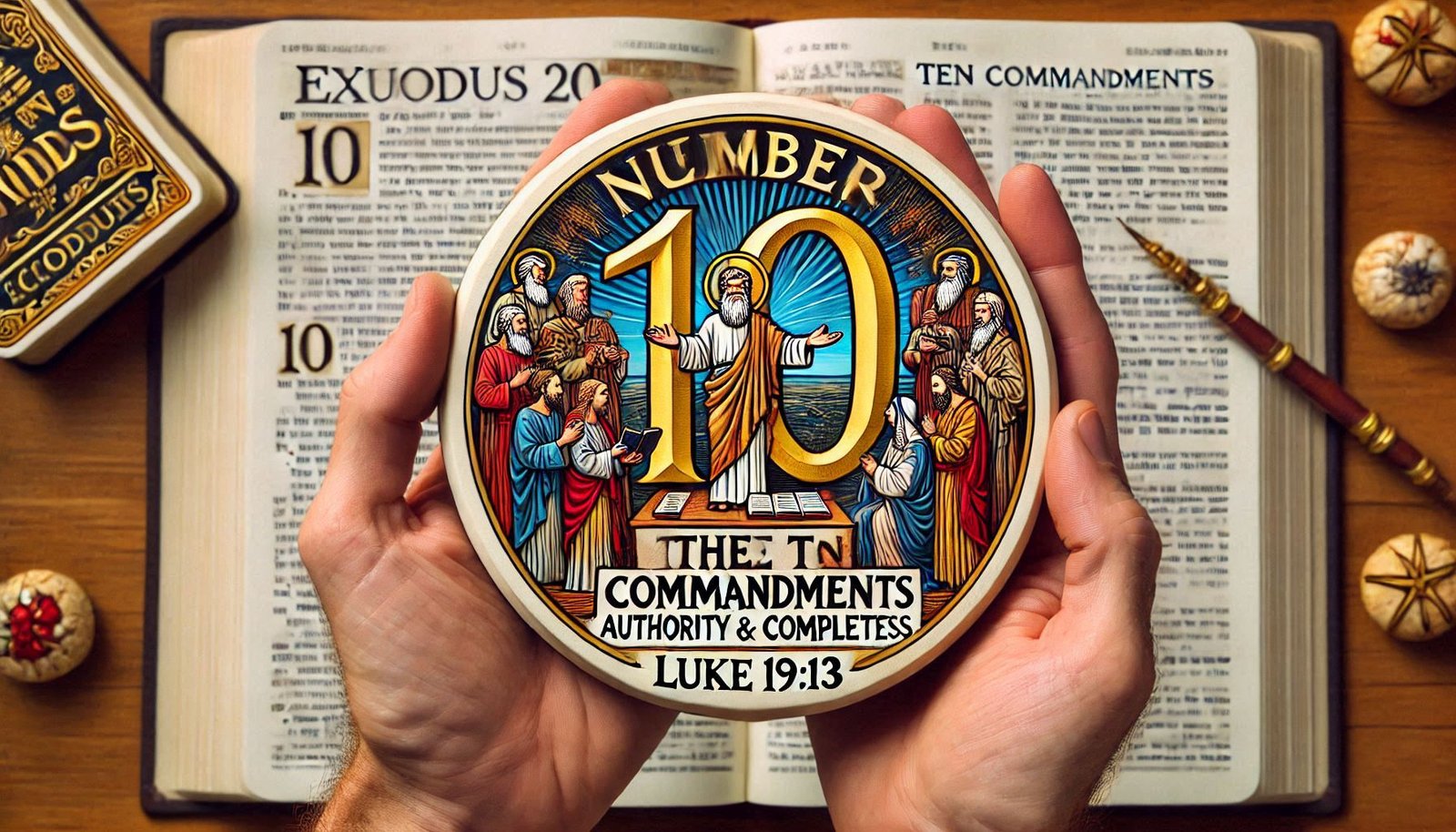Biblical Numerology: The Significance of the Number Ten (10)
Biblical numerology is a fascinating study that assigns spiritual and symbolic meanings to numbers found in scripture. The number ten holds particular importance, often symbolizing divine order, completeness, law, and human responsibility. Its frequent appearance in both the Old and New Testaments underscores its role in conveying key theological principles and God’s structure for His creation.
Symbolism of the Number Ten
The number ten often represents perfection of order or completeness in biblical narratives. It frequently appears in contexts where God’s laws, authority, or plans for humanity are emphasized, signifying divine structure and human accountability.
Completeness and Divine Order
In biblical numerology, ten symbolizes the fullness of divine order. It reflects a complete cycle of events or the perfection of God’s design. For example:
The Ten Commandments
The most famous example is the Ten Commandments (Exodus 20:1-17), which serve as the foundation of God’s covenant with Israel. These commandments represent a complete moral code that governs human behavior in relation to God and others.
The Tenth Part (Tithing)
In the Old Testament, a tithe (one-tenth of a person’s earnings or produce) was offered to God as an acknowledgment of His provision and sovereignty:
“Bring the whole tithe into the storehouse, that there may be food in my house” (Malachi 3:10).
This practice reflects the principle of completeness in honoring God with the first portion of what He has provided.

Human Responsibility and Accountability
The number ten also symbolizes human responsibility under divine law. The Ten Commandments serve as a complete guide to moral living, outlining humanity’s duties toward God and each other. This reflects the idea that God’s law is both comprehensive and binding.
Additionally, the ten plagues of Egypt (Exodus 7-12) illustrate how God holds humanity accountable. Each plague served as a judgment against Pharaoh and the gods of Egypt, leading to Israel’s liberation and underscoring the consequences of disobedience.
Key Biblical References to the Number Ten
The number ten appears in many significant biblical passages, emphasizing its symbolic meanings of law, order, and completion:
The Ten Commandments
Found in Exodus 20:1-17, these represent the complete moral law given to humanity.
The Ten Plagues of Egypt
God sent ten plagues upon Egypt to demonstrate His power and judgment, ultimately securing Israel’s release from bondage (Exodus 7-12).
The Parable of the Ten Virgins
In Matthew 25:1-13, Jesus tells the parable of ten virgins, five wise and five foolish, to illustrate preparedness for His return. This story emphasizes human responsibility and readiness for the Kingdom of God.
Tithing (The Tenth Part)
The tithe reflects human acknowledgment of God’s provision, illustrating the principle of completeness and trust in God’s sustenance (Leviticus 27:30-32).
The Ten Generations
In Genesis, there are ten generations from Adam to Noah, signifying a complete cycle leading to God’s judgment through the flood (Genesis 5).

Theological Themes Associated with the Number Ten
1. God’s Sovereignty and Authority
The number ten reflects God’s sovereign rule over creation. Through the Ten Commandments, God establishes His moral authority, while the ten plagues demonstrate His power over nature and false gods.
2. Moral and Spiritual Completeness
The Ten Commandments symbolize a complete moral framework. They guide humanity in living righteously before God and others.
3. Judgment and Deliverance
The ten plagues represent God’s judgment on disobedience and His deliverance of the faithful. This dual theme highlights the completeness of God’s justice.
4. Preparation and Accountability
The parable of the ten virgins reminds believers to remain vigilant and prepared for Christ’s return. This story underscores the completeness of human responsibility in spiritual matters.
Symbolism in Daily Application
The number ten offers practical and spiritual lessons for believers today:
Honoring God’s Sovereignty: Like the practice of tithing, acknowledging God’s authority over all aspects of life fosters gratitude and trust.
Obedience to Divine Order: The Ten Commandments remind believers to align their lives with God’s will.
Readiness for Christ’s Return: The parable of the ten virgins emphasizes the importance of spiritual vigilance and preparation.
Trust in God’s Justice: The ten plagues illustrate that God is faithful to judge wrongdoing and deliver His people.

Conclusion
The number ten in biblical numerology symbolizes divine order, completeness, human responsibility, and preparation. Its recurrence in scripture—through the Ten Commandments, the ten plagues, and the parable of the ten virgins—highlights its central role in expressing God’s moral and spiritual framework.
By understanding the significance of the number ten, believers can gain a deeper appreciation of God’s structured plans, His call for accountability, and the assurance of His justice and provision. This number stands as a testament to the perfect balance of divine authority and human responsibility within the biblical narrative.
https://divinetruthofnumbers.com/significance-of-the-number-nine-9/




